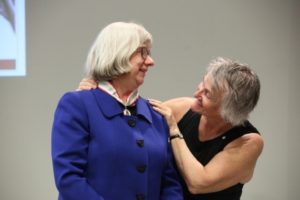Lawyers recognized for long-time First Nations advocacy

By Rick Garrick
TORONTO—Two lawyers whose careers have focused on advancing rights and increasing social justice for First Nations people were recognized with Law Society Medals on May 24.
Larry Chartrand, from Ottawa, and Sarah E. Colquhoun, from Thunder Bay, were presented with the medals during the Law Society of Upper Canada’s annual Law Society Awards ceremony in Toronto.
“The Law Society Medal is to recognize significant contributions to the legal profession, and in my case it’s to do with the work I’ve done as a professor trying to promote and reform Indigenous law and bring awareness to some of the issues regarding a disconnection between Aboriginal law and justice,” says Chartrand, who was called to the Bar in 1991 and was recognized for his work in advancing Aboriginal and Métis rights. “And to kind of expose in a sense the failings of the legal system in terms of recognizing Indigenous rights and to promote a more critical analysis of the law in regards to Aboriginal issues so that justice and law can come closer together.”
Chartrand began working on Aboriginal law issues in 1986 and was recently appointed as the new director of the Native Law Centre at the University of Saskatchewan.
“Even when I was in law school I started working on Aboriginal legal issues,” Chartrand says. “That was my focus of my study and then when I became a professor, I just naturally continued.”
Chartrand plans to work on increasing recognition of the Indigenous people’s own laws.
“Canadian common law, English common law is only one source of law in this country,” Chartrand says. “Anishinabe, Haudenosaunee and Métis law are equally valid and should be recognized.”
Colquhoun was called to the Bar in 1984 and was recognized for her leadership and advocacy. She has worked with Kinna-aweya Legal Clinic in Thunder Bay for about 30 years.
“It’s an acknowledgement of the kind of work legal clinics do, that we represent vulnerable people in trying to achieve social justice,” Colquhoun says. “Although we do have a focus on Indigenous communities, we do represent all low-income people. The work we are doing is poverty law, representing people and trying to assist them in getting income maintenance and maintain housing.”
Colquhoun says law reform and community legal education work are also done at the Kinna-aweya Legal Clinic, which also has offices in Geraldton and Marathon.
“People who work in legal clinics have always thought that the work we do is incredibly important,” Colquhoun says. “It’s wonderful for the Law Society to recognize that as well.”
Colquhoun says some of the other Law Society award recipients also work with Indigenous people or in legal clinics.
“Grace Alcaide Janicas, who is a lawyer at the legal clinic in Sault Ste. Marie, was awarded the J. Shirley Denison Award for social justice,” Colquhoun says. “And one of the other Law Society Medal winners was previously a legal aid lawyer, so I think there was a lot of recognition of the kind of work that’s being done in legal clinics for low-income people.”
Colquhoun plans to keep working at the Kinna-aweya Legal Clinic until she retires.
The Law Society also recognized Patrick Case, Michael Eizenga, Marie Henein, Joanna Radbord and Gary Yee with Law Society Medals and Thora H. Espinet with the Lincoln Alexander Award, Breese Davies with the Laura Legge Award and Dena D. Castro with the William J. Simpson Distinguished Paralegal Award.

